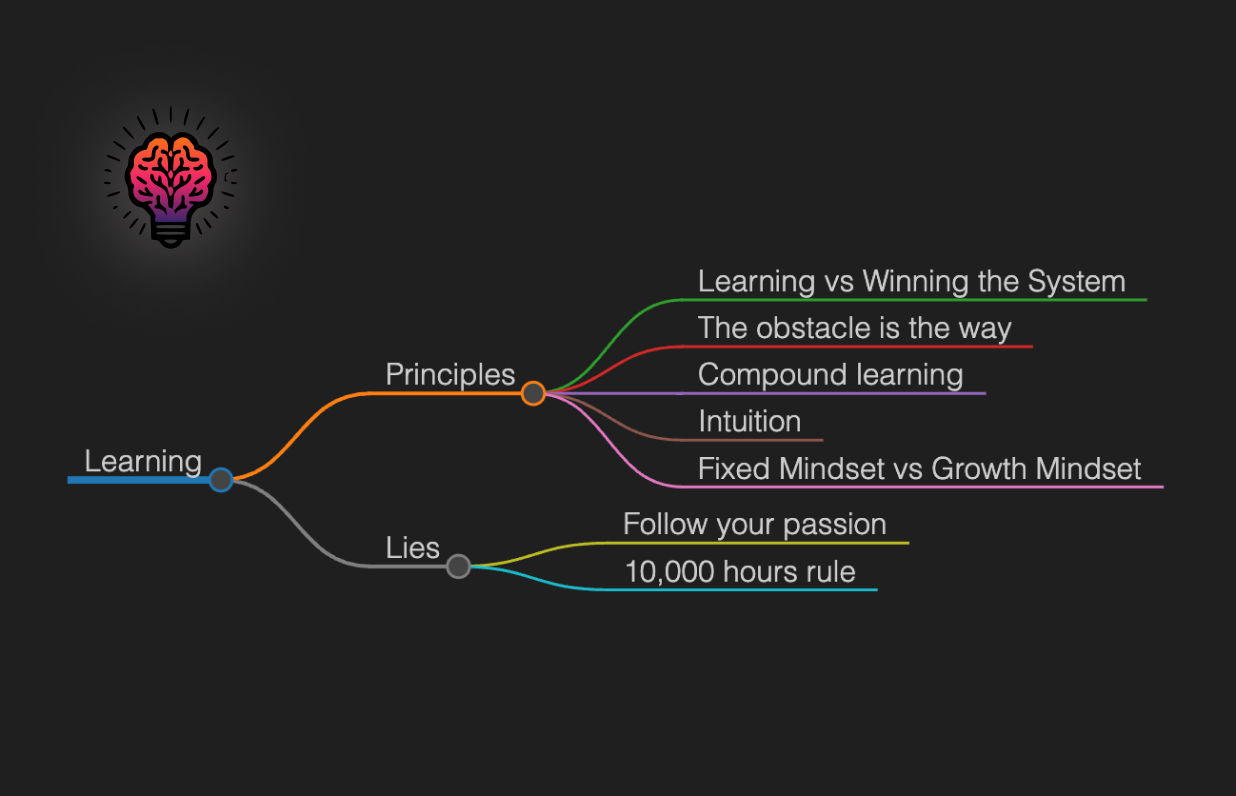The Principles and Lies of Learning

Principles
Learning vs Winning the System
"The goal of learning is not to win the game of school, but to maximize your potential." - Scott Young
- Advocates for a focus on learning and personal growth, not just grades and accolades.
- Emphasizes the value of intrinsic motivation and a genuine interest in learning.
- Challenges the conventional approach to education and career development, which often prioritizes extrinsic rewards and superficial achievement.
The obstacle is the way
"The impediment to action advances action. What stands in the way becomes the way." - Marcus Aurelius
- Sometimes obstacles teach us more than we could have learned without them.
- Suggests that obstacles and challenges can be significant learning opportunities and should be embraced as a part of the learning journey.
- Emphasizes resilience and learning from failures and difficulties.
Compound learning
"Improve by 1% a day, and in 70 days you’re twice as good. - Alan Weiss, Ph. D"
- The principle of compound learning is that small, incremental improvements can lead to significant progress over time.
- Advocates for a steady, incremental approach to skill acquisition and knowledge enhancement.
- Emphasizes the value of consistency and persistence in learning.
Intuition
"Intuition is the ability to acquire knowledge without recourse to conscious reasoning." - Wikipedia
- Suggests that intuition can be a valuable tool for learning and decision-making.
- Emphasizes the value of intuition as a complement to logic and reasoning.
- Encourages learners to trust their intuition and use it as a guide for learning and decision-making.
- Intuition is a powerful tool for learning and decision-making. It can help you make better decisions, solve problems more effectively, and learn new skills more quickly.
Fixed Mindset vs Growth Mindset
"In a fixed mindset, people believe their basic qualities, like their intelligence or talent, are simply fixed traits. They spend their time documenting their intelligence or talent instead of developing them. They also believe that talent alone creates success—without effort. They’re wrong. In a growth mindset, people believe that their most basic abilities can be developed through dedication and hard work—brains and talent are just the starting point. This view creates a love of learning and a resilience that is essential for great accomplishment." - Carol Dweck
- Emphasizes a growth mindset versus a fixed mindset, advocating the belief that abilities can be developed through dedication and hard work.
- Encourages viewing challenges as opportunities for growth and learning, rather than obstacles.
- Promotes the idea of 'trainability' in all aspects of life, urging individuals to adopt a proactive approach to learning and self-improvement.
- Understand the "Locus of control" as a concept in psychology that refers to the extent to which individuals believe they can control events that affect them.
Common Myths about Learning
Follow your passion
"Follow your passion" is dangerous advice. It suggests that there's a perfect match out there waiting for you. And if you find it, everything will be great. But if you don't, you'll never be happy. It's a destructive myth. - Cal Newport - So Good They Can't Ignore You.
Following your passion is a lie that's been told to us by our parents, our teachers, our mentors, and our peers, the media, by our culture, and by our society. Don't get me wrong, everyone has a passion but in terms of being an effective learner, you could be really good at something that is not really your passion.
There is term known as "Overjustification", which related to "follow your passion" represents that, once you start following your passion and also you start getting paid for it, you start to lose your passion. So, it's important to consider that your passion can be developed and nurtured through competence and mastery, not just inherent interest.
Recommendations
- Challenge the conventional advice of blindly following your passion for career or learning decisions.
- Consider that your passion can be developed and nurtured through competence and mastery, not just inherent interest.
- Emphasize the need for a balance between your passion and practicality, advocating for skills and knowledge that are in demand and personally satisfying.
10,000 hours rule
"The 10,000-hour rule is a lie. It's not a magic number that you can apply to any skill or any person." - Scott Young
In 1993 a study was published by Anders Ericsson, Ralf Krampe, and Clemens Tesch-Romer called "The Role of Deliberate Practice in the Acquisition of Expert Performance". The study was about violinists at the Berlin Academy of Music. The study found that the best violinists had practiced for 10,000 hours by the age of 20. The study was popularized by Malcolm Gladwell in his book "Outliers" and the 10,000 hours rule was born. The issue with this metric of 10,000 in the learning context is that it's not a one size fits all. It's not a magic number that you can apply to any skill or any person. It's a very specific number that applies to a very specific group of people.
Recommendations
- Everyone has advantages and disadvantages, so it's important to consider your unique circumstances when setting goals.
- Focus on the quality of your practice, not just the quantity.
- Consider the value of deliberate practice but being an efficient learner, which involves setting specific goals, receiving feedback, and making adjustments.